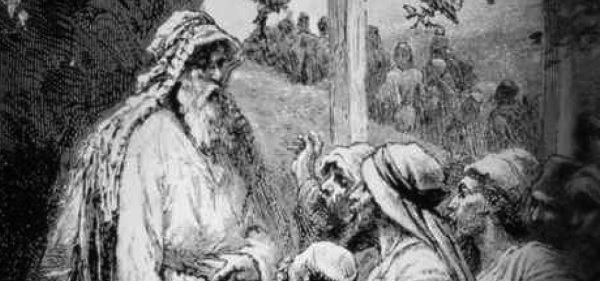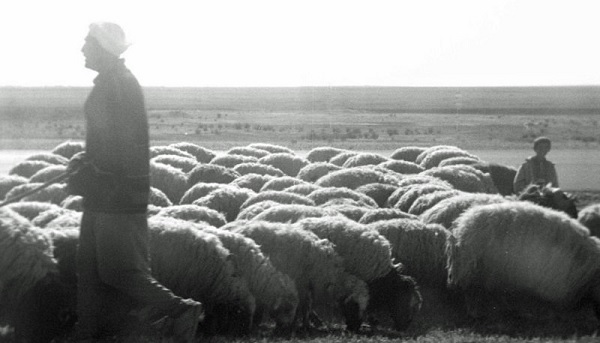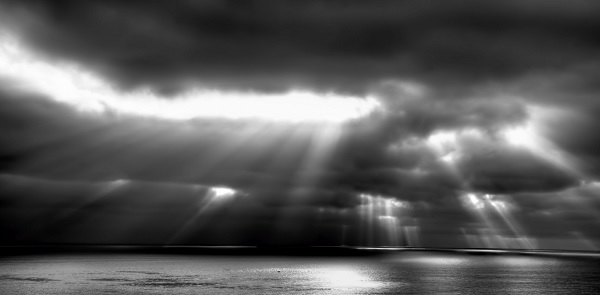Breaking Out of the Fold:
Seeing the Kingdom of God through 1st Century Rabbinic Eyes
By Ray Vander Laan

In our modern age, which by and large lacks kings—at least ones with any real political power—the notion of God’s kingdom doesn’t tend to say very much to us. At best, it is a nice-sounding, far-off idea. When one looks at the Gospels, however, and particularly the teachings of Jesus, it quickly becomes clear that the kingdom of God is a major, major focus, and it becomes very important that we understand what Jesus himself meant when he used the phrases “the kingdom of heaven” and “the kingdom of God.” For me, and, I have found, for many others, it has been helpful to discover what the culture of Jesus’ day understood when they talked about God’s kingdom. In my opinion, not only is it a great key to understanding our Christian text, and particularly Jesus’ parables, but it is also a powerful encouragement for those who love God and want to make a difference in the world around them.
In Jewish thought of the first century, which of course includes Jesus’ own words and the Gospel writers’ own writing, it seems to me there are three things we ought to note. To understand their perspective, we need to understand three things: what they meant by ‘kingdom,’ where the kingdom is found, and what it does.
First, to the first-century Jew, “the kingdom of heaven” and “the kingdom of God” were interchangeable terms, and they refer to the reign of God wherever it’s found. To them, God reigns where his will is obeyed, and there you find shalom. To put it differently, wherever things are happening exactly the way God ordered them and wants them, wherever people are living in obedience and commitment to God, there you have the kingdom of heaven.
Saying that, I must stress that the kingdom of God is not, in the Jewish mind, in any way synonymous with the life to come. Nor is it synonymous with the church or synagogue. Rather, the kingdom of heaven will be found in the life to come, and it ought to be found in the local assemblies of God’s people. The ancient rabbis, including Jesus, did not teach a message that basically said, “If you do this, you’ll go to heaven.” The Jews already knew that God was going to forgive their sins based on His promise to Abraham and the blood path of Genesis 15. Instead, these Jewish teachers came to say, “If you want to join the kingdom of God, here’s how you’ve got to live today, because God’s will has to be done on earth as it is in heaven.”
I find that to be a big difference in perspective from how we tend to think. To use a personal example, I was 25 years old before it began to dawn on me that “your kingdom come” is not a prayer for the second coming! For all those years, I didn’t know that “your kingdom come” is a prayer that cries out, “God, may I do what you want me to today.” That’s why “may your will be done on earth as it is in heaven” immediately follows. Now, heaven someday will be the kingdom of God. I praise God for that, but that is not what I pray for. Instead, I ask that God will give me the Spirit so that I may live in harmony with Him. Then, the kingdom of heaven will be at hand.
This understanding changed the paradigm that I operated with, and maybe if you hear me and think about what I’m suggesting, you will say the same thing. The kingdom of heaven is found right now where people are living in harmony with God. And I pray to God that every one of you reading this are in the kingdom of heaven. If you look at your life and say, God’s way is this and my way is that, then you are not living in the kingdom of heaven. You’re not even close. Now I’m not saying you’re not saved or haven’t been transferred into Jesus’ kingdom (see Colossians 1:13). You’re just not living in what Jesus died for you to experience. For the record, this idea of the kingdom is the same concept the Jews had of eternal life. Eternal life doesn’t simply mean what will happen after death. Eternal life means God’s kind of life, shalom.
The Inside-Out Kingdom
Second, in the Jewish mind, the kingdom of God comes not from outside, but from within. The kingdom “is something,” wrote one rabbi, “that becomes such a fire inside of a person, that they can’t hold it in. They are compelled to go out and to seek by the power of God to bring things into shalom and harmony with Him.” It’s from within. We see this in Jesus’ own words. Luke records:
Once, having been asked by the Pharisees when the kingdom of God would come, Jesus said, “The kingdom of God does not come through your careful observation, nor will people say, ‘Here it is,’ or ‘There it is,’ because the kingdom of God is within you.” (Luke 17:20-21)
To the Jews, the focus of this concept was that God is the one who plants his kingdom inside. It’s a miracle. It’s not something one earns, it’s not something one gains by knowledge, it’s not something one accomplishes by baptism or bar mitzvah or a sacrifice—it’s something God plants within. And Jesus was not alone among the rabbis of his time in saying that the kingdom of God, or the ability to want to live in harmony with God, is something that gets planted inside of you and burns to come out.
I had a Jewish rabbi once say to me, “I think the fact that all you Christians pray the Lord’s Prayer proves to me you don’t understand Jewish culture.” I was offended. “Who are you to tell me?” I thought. And he continued, “If you understood what you were asking when you said ‘Your kingdom come,’ defined by ‘your will be done,’ you wouldn’t dare flippantly pray that, because what you’re saying is, ‘God, will you so work that my entire being is caught up with a burning passion to be totally obedient to you. Will you make disgusting in my mouth anything that’s contrary to your will.’” Will we dare pray that? Will we dare ask God to put His kingdom into our life? If we do, it means every single thing that we hold dear that is not rightly related to Jesus Christ has to be gotten rid of. What we think, what we say, what we do— anything that’s inconsistent with Jesus Christ has got to go right now if we want the kingdom.
That’s scary, because most of us would like a piece of the kingdom and the rest of the time to do things according to what we like and want. But it seems to me the kingdom of Jesus Christ comes where there’s a community of people who stir each other up to a total commitment to the teaching that our rabbi Jesus gave us.

Mustard and Yeast
The third way the first-century Jews understood God’s kingdom has absolutely captured my mind and my heart. If someone were to ask what concept in the ministry of Jesus has been most overpowering for me, it’s this one: to the Jewish mind, and I believe clearly to Jesus, the kingdom of God is absolutely unstoppable once it is planted and arrives on the scene.
This idea is again quite contrary to how we normally think about the kingdom. But if we understand that the kingdom of God is spread by God miraculously planting it in hearts, and then by those hearts burning to go out into the world to bring that miracle to others, I do not think that we can look at the future and say the world’s going to get worse and worse and worse, that it’s going to get so bad that if we don’t hang on by our fingernails, we won’t make it. I don’t buy that. I don’t buy that kind of pessimism. I don’t think the kingdom of heaven is something that’s going to barely hang on.
Now there are two pictures common in rabbinic teaching and found in Jesus’ own words which were used to describe this idea of the kingdom being absolutely impossible to stop. The first one they used was the seed. Jesus happened to use what they thought to be the littlest of all seeds, the mustard seed, and other rabbis used different kinds of seeds. Nevertheless, they compared the kingdom to a seed, one that once it is planted, can’t be stopped from taking over the garden—that is to say it eventually will consume whole communities, people groups, and nations.
Let’s look at Matthew 13:31-32. I love this parable. It’s so encouraging, so positive, and so powerful. Jesus said, “The kingdom of heaven is like a mustard seed, which a man took and planted in his field. Though it is the smallest of all your seeds, yet when it grows, it is the largest of garden plants in your garden; the birds of the air come and perch in its branches.” The Jews were familiar with gardens. Mustard grows like crazy. Just try and stop a mustard seed from becoming the biggest thing in the garden. The only way to do it is not plant it, for once that seed is planted, it can’t be stopped.
Similarly, Jesus taught about the kingdom with another word picture. He said, “The kingdom of heaven is like yeast that a woman took and mixed into a large amount of flour until it worked through the whole dough” (Matthew 13:33). It intrigues me that the rabbis frequently said that God performed a miracle every time a woman made bread. They were not biologists, so they had no idea what was happening with yeast. They just noticed that if you put a little in some dough, my goodness, all of a sudden the whole thing rises. I think Jesus used yeast to say that the kingdom of heaven works miraculously, that once it gets started, no one can stop it. It is going to affect everything it touches. That’s the image that Jesus had of the kingdom he came to bring.
This idea is so profound, and I have such a passion for teaching it. I believe in much of Christianity we have lost the fullness of the covenant idea surrounding the kingdom. We understand the first part, that salvation is a miracle of God like a mustard seed being planted or like yeast being put in bread. I can’t put the yeast in me or in you, and you can’t put the mustard seed in you or in me. Of course, God alone can do that. But once he does—and here’s the part we tend to neglect—he expects profound results.
We tend to teach salvation by grace so cheaply, and when we do we can tend to kill the passion to become a fully godly people. That is not the teaching that Jesus gave to us. He taught the kingdom, that the grace God puts inside of people revolutionizes them and the world around them.

Violent, Passionate Sheep
The book of Micah contains a prophecy that I believe Jesus draws on to help us understand the kingdom. The first-century Jews applied Micah 2:12-13 to the coming of the Messiah, described in terms of sheep and a shepherd. It reads:
I will surely gather all of you, O Jacob;
I will surely bring together the remnant of Israel.
I will bring them together like sheep in a pen,
like a flock in its pasture; the place will throng with people.
One who breaks open the way will go up before them;
they will break through the gate and go out.
The king will pass through before them,
the LORD at their head.
The rabbis in Jesus’ time taught about two principal characters being involved in this passage. One character is going to forcefully open the way, and the second character, the king, is going to come through and establish his kingdom.
So, the picture in Micah is that of a sheepfold, packed with sheep. The shepherd is lying across the entrance to that stinky cave (in Israel, stables are often caves, covered in layers of dung and soot—certainly a far cry from the Western manger scene with golden straw), and then in the morning, he goes to that wall that’s enclosed them, and he takes a piece of it down. Then, those sheep, whose energy has been pent up in that little tiny pen all night long, come flooding out. That, the first-century rabbis taught, is what it would be like when the Messiah came. Who, they taught, will open the way? Elijah. Who will come bursting through? The Messiah and his disciples, to establish the kingdom of God.
With this in mind, now listen to something that Jesus says.
In Matthew 11:12-14, when read in light of the culture, Jesus is saying something profound about John and himself. Jesus said: “From the days of John the Baptist until now, the kingdom of heaven has been forcefully advancing, and forceful men lay hold of it. For all the Prophets and the Law prophesied until John. And if you are willing to accept it, he is the Elijah who was to come.”
Do you see it? Jesus is drawing on the first-century teaching on Micah 2. Reading this passage in light of it, I find Jesus is saying this: “John broke an opening. He broke down a piece of the fence. All of those people of God had been trapped in there. John the Baptist opened the way, and out came me, the king, with my whole flock.”
Now, we have to understand that this flock is not a bunch of meek people. They aren’t saying, “We don’t know if we’re going to make it,” or “Let’s run and hide from the world,” or “I think I’ll just stay in the fold.” No, these are a fired-up, passionate group of people who seize the kingdom with power and who live it passionately. That’s what the kingdom of heaven is, in my opinion and the Jewish context, but much more importantly, to Jesus. Jesus is calling on his followers to be people who are people of passion, who can’t wait to follow him and begin living the kingdom of God.

Do you feel like a sheep that’s been bottled up for two weeks and now sees an opening? If you don’t feel that way about your Christian faith, I don’t think you understand the kingdom of God. I would like to think that when you hear the words of Jesus, you can’t wait for your alarm clock to go off in the morning because you are going to have the chance to bring the kingdom of God. I want to be that kind of person.
Let’s listen to Jesus and be those members of the kingdom of God who want to live in shalom with him in an unstoppable power. Let’s be those people who have passion and will grab hold of the kingdom and live it with enthusiasm. If we do, our lives and the world will never be the same.


 Ray Vander Laan has studied and taught Jewish culture for over 35 years, and he is passionate about helping believers understand the Scriptures in light of their Jewish context so they can better impact the world for Christ. He holds a Master’s of Divinity degree from Westminster in Philadelphia, PA, and has pursued graduate work in the States, Israel, and elsewhere in the Middle East. To learn more about Ray and to check out more of his teachings, visit www.followtherabbi.com or www.rvl-on.com.
Ray Vander Laan has studied and taught Jewish culture for over 35 years, and he is passionate about helping believers understand the Scriptures in light of their Jewish context so they can better impact the world for Christ. He holds a Master’s of Divinity degree from Westminster in Philadelphia, PA, and has pursued graduate work in the States, Israel, and elsewhere in the Middle East. To learn more about Ray and to check out more of his teachings, visit www.followtherabbi.com or www.rvl-on.com.